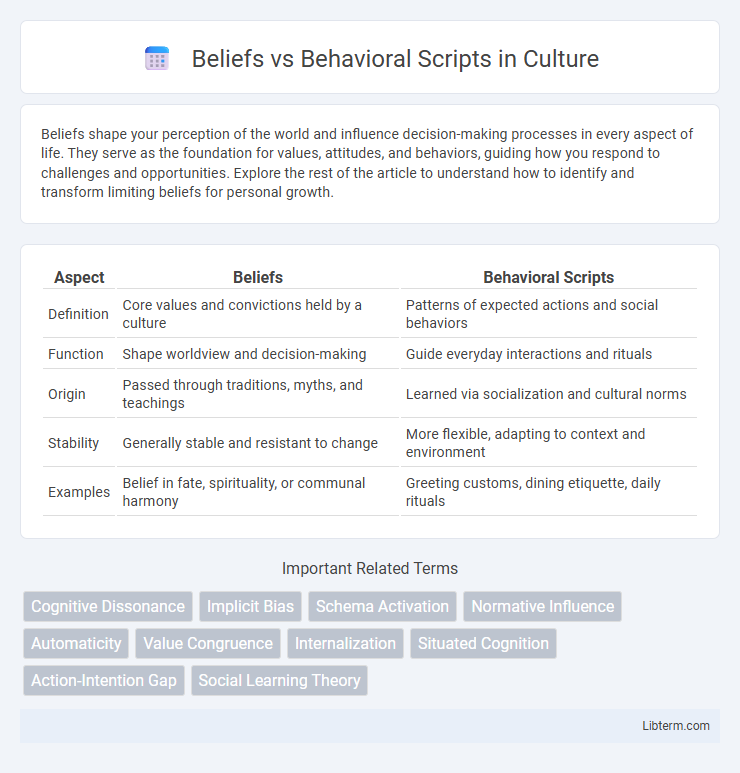Beliefs shape your perception of the world and influence decision-making processes in every aspect of life. They serve as the foundation for values, attitudes, and behaviors, guiding how you respond to challenges and opportunities. Explore the rest of the article to understand how to identify and transform limiting beliefs for personal growth.
Table of Comparison
| Aspect | Beliefs | Behavioral Scripts |
|---|---|---|
| Definition | Core values and convictions held by a culture | Patterns of expected actions and social behaviors |
| Function | Shape worldview and decision-making | Guide everyday interactions and rituals |
| Origin | Passed through traditions, myths, and teachings | Learned via socialization and cultural norms |
| Stability | Generally stable and resistant to change | More flexible, adapting to context and environment |
| Examples | Belief in fate, spirituality, or communal harmony | Greeting customs, dining etiquette, daily rituals |
Understanding Beliefs and Behavioral Scripts
Understanding beliefs involves recognizing the deep-seated convictions that influence how individuals interpret information and make decisions, shaping their worldview and guiding moral judgments. Behavioral scripts refer to predetermined sequences of actions that individuals follow in specific contexts, often learned through socialization and reinforced by cultural norms. Analyzing the interaction between beliefs and behavioral scripts reveals how cognitive frameworks drive routine behaviors and affect adaptive responses in social environments.
The Psychology Behind Beliefs
Beliefs are cognitive constructs that shape an individual's perception of reality, influencing emotions and guiding decision-making processes. In psychology, beliefs function as mental representations formed from experiences, social interactions, and cultural norms, serving as stable frameworks for interpreting events. Behavioral scripts, on the other hand, are sequences of expected actions linked to particular social contexts, often triggered by underlying beliefs, reflecting learned patterns that facilitate adaptive responses in familiar situations.
Defining Behavioral Scripts
Behavioral scripts are structured sequences of actions people expect to follow in specific contexts, guiding automatic and predictable behaviors. These scripts are cognitive frameworks that simplify decision-making by outlining typical procedures in routine situations, such as ordering food at a restaurant or attending a meeting. Unlike beliefs, which are internal convictions about truth or value, behavioral scripts focus on the practical execution of tasks shaped by social norms and past experiences.
How Beliefs Shape Daily Actions
Beliefs function as cognitive frameworks that influence individuals' daily actions by shaping expectations and guiding decision-making processes. Behavioral scripts are routines or patterns learned through these beliefs, enabling predictable responses in social situations and habitual activities. The alignment between core beliefs and behavioral scripts determines consistency in actions and shapes long-term behavioral outcomes.
Differentiating Beliefs from Behavioral Scripts
Beliefs represent internal convictions or accepted truths that guide an individual's understanding of the world, while behavioral scripts are predefined sequences of actions triggered by certain contexts. Differentiating beliefs from behavioral scripts is crucial because beliefs shape motivations and attitudes, whereas behavioral scripts dictate observable patterns of conduct. Recognizing this distinction helps in designing interventions that target either cognitive frameworks or habitual behaviors for effective personal or organizational change.
The Interplay Between Thoughts and Behavior Patterns
Beliefs shape cognitive frameworks that influence behavioral scripts, creating a dynamic interaction where thoughts guide habitual actions and routines reinforce underlying convictions. This interplay between internal mental states and external behavior patterns highlights how persistent beliefs can predict consistent reactions in specific contexts. Understanding this reciprocal relationship aids in modifying maladaptive behaviors by addressing the cognitive structures that sustain them.
Cultural Influences on Beliefs and Scripts
Cultural influences shape both beliefs and behavioral scripts by providing shared norms, values, and practices that guide individual and group behaviors across societies. These cultural frameworks inform what is considered appropriate or acceptable, thus embedding specific beliefs and prescribed behavioral scripts within social interactions. Understanding the interplay between culture, beliefs, and scripts is essential for interpreting human behavior and communication in diverse cultural contexts.
Changing Beliefs: Impact on Behavioral Scripts
Changing beliefs significantly reshapes behavioral scripts by altering the underlying cognitive frameworks that guide actions and decision-making processes. Modifications in core beliefs trigger the reorganization of habitual response patterns, leading to adaptive or maladaptive behavioral changes in various social and psychological contexts. Empirical studies in cognitive-behavioral therapy demonstrate that interventions targeting belief systems produce measurable shifts in behavior, highlighting the crucial interplay between belief transformation and script modification.
Practical Examples of Beliefs vs. Behavioral Scripts
Beliefs, such as trusting that honesty leads to positive relationships, shape decision-making by influencing core values, while behavioral scripts provide explicit step-by-step actions, like apologizing when one tells a lie. For instance, a belief in cooperation may result in the behavioral script of greeting coworkers warmly and offering help during team projects. In customer service, the belief that customer satisfaction is crucial translates into behavioral scripts like actively listening to complaints and promptly addressing issues.
Transforming Your Life Through Script Awareness
Transforming your life through script awareness involves recognizing the contrast between deeply held beliefs and automatic behavioral scripts that guide daily actions. By identifying and challenging limiting beliefs, you can rewrite behavioral scripts that unconsciously dictate patterns, allowing for intentional change and personal growth. Increased script awareness empowers conscious decision-making, fostering more adaptive behaviors aligned with your true values and goals.
Beliefs Infographic

 libterm.com
libterm.com